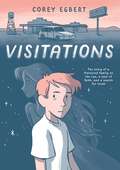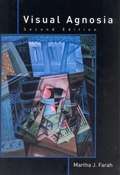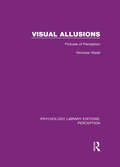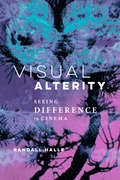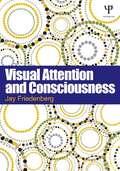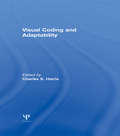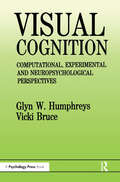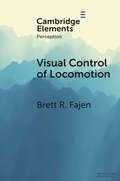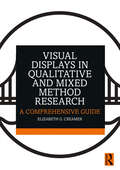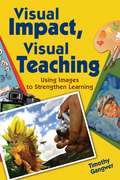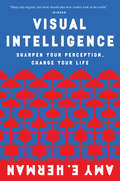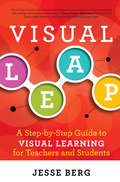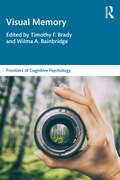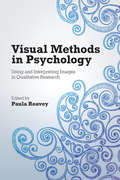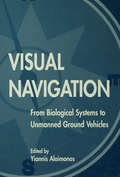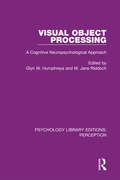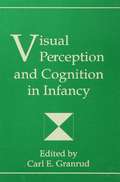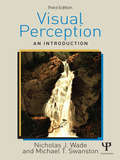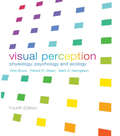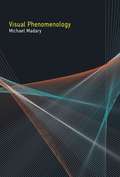- Table View
- List View
Visitations
by Corey EgbertInspired by true events, this haunting yet hopeful young adult graphic novel weaves together family dynamics, mental illness, and religion—perfect for fans of Hey, Kiddo.Corey’s mom has always made him feel safe. Especially after his parents’ divorce, and the dreaded visitations with his dad begin. But as Corey grows older, he can’t ignore his mother’s increasingly wild accusations. Her insistence that God has appointed Corey as his sister’s protector. Her declaration that Corey’s father is the devil.Soon, she whisks Corey and his sister away from their home and into the boiling Nevada desert. There, they struggle to survive with little food and the police on the trail. Meanwhile, under the night sky, Corey is visited by a flickering ghost, a girl who urges him to fight for a different world—one outside of his mother’s spoon-fed tales, one Corey must find before it’s too late.Drawing inspiration from his own upbringing in the Mormon church, Corey Egbert welcomes readers on an emotionally stirring, nuanced journey into the liminal spaces between imagination and memory, faith and truth.
Visual Agnosia (Second Edition)
by Martha J. FarahThe second edition of the classic book on visualagnosia, updated to include disorders of semantic knowledge andtopographic recognition, and integrating perspectives from functional neuroimaging throughout.
Visual Allusions: Pictures of Perception (Psychology Library Editions: Perception #32)
by Nicholas WadeIn this book a leading researcher and artist explores how we see pictures and how they can communicate messages to us, both directly and indirectly by making allusions to objects in space or to stored images in our minds. Originally published in 1990, Dr Wade provides fascinating examples of pictures that communicate hidden messages, either by implying something else, or by a shape or portrait which is carried covertly within another design. He analyses image processing stages in vision, demonstrating that the various stages may be related to styles in representational art. He shows how the way we have been taught to look at and recognise objects, affects the way we see them. The book lavishly illustrates with original examples of visual allusions and includes detailed practical advice on how photographers and designers can create them. Essential reading for photographers, designers, artists, people in film and television, and anyone involved in visual science , visual communication and advertising.
Visual Alterity: Seeing Difference in Cinema
by Randall HalleReconsidering the dynamics of perception Using cinema to explore the visual aspects of alterity, Randall Halle analyzes how we become cognizant of each other and how we perceive and judge another person in a visual field. Halle draws on insights from philosophy and recent developments in cognitive and neuroscience to argue that there is no pure "natural" sight. We always see in a particular way, from a particular vantage point, and through a specific apparatus, and Halle shows how human beings have used cinema to experiment with the apparatus of seeing for over a century. Visual alterity goes beyond seeing difference to being conscious of how one sees difference. Investigating the process allows us to move from mere perception to apperception, or conscious perception. Innovative and insightful, Visual Alterity merges film theory with philosophy and cutting-edge science to propose new ways of perceiving and knowing.
Visual Attention and Consciousness
by Jay FriedenbergConsciousness is perhaps one of the greatest mysteries in the universe. This ambitious book begins with a philosophical approach to consciousness, examining some key questions such as what is meant by the term "conscious," and how this applies to vision. The book then explores major visual phenomena related to attention and conscious experience—including filling-in processes, aftereffects, multi-stability, forms of divided attention, models of visual attention, priming effects, types of attentional blindness and various visual disorders. For each phenomenon, the biological and cognitive level research is reviewed. Themes touched upon throughout are the relation between consciousness and attention, automatic vs. willful processes, singularity vs. multiplicity, and looking without seeing. The book concludes with an evolutionary approach, describing possible functions that visual consciousness may serve and how those may affect the way we see. The systematic review of key topics and the multitude of perspectives make this book an ideal primary or ancillary text for graduate courses in perception, vision, consciousness, or philosophy of mind.
Visual Coding and Adaptability
by Charles S. HarrisFirst published in 1980. This book is the first integrated presentation of two of the most active areas in present-day visual research. Its inspiration and nucleus were provided by two Optical Society of America symposia, one on the coding of spatial information in the visual system and the other on adaptability of the visual system. Although the two topics might seem, at first sight, only distantly related, they are actually extensively intertwined in contemporary research. Some investigators focus on mechanisms of visual analysis but rely on experimental modification of perception to reveal the nature of the coding; others focus on perceptual modification but look at analytic elements for indications about what it is that gets modified. Likewise, most of the chapters in this book combine, in varying proportions, both themes. Adult human perception is the primary concern, but illuminating data from animal, infant, and neurophysiological studies are also discussed.
Visual Cognition: Computational, Experimental and Neuropsychological Perspectives
by Vicki Bruce Glyn W. HumphreysVision allows us to do many things. It enables us to perceive a world composed of meaningful objects and events. It enables us to track those events as they take place in front of our eyes. It enables us to read. It provides accurate spatial information for actions such as reaching for or avoiding objects. It provides colour and texture that can help us to separate objects from their background, and so forth. This book is concerned with understanding the processes that allow us to carry out these various visually driven behaviours. In the past ten years our understanding of visual processing has undergone a rapid change, primarily fostered by the convergence of computational, experimental and neuropsychological work on the topic. Visual Cognition provides the first major attempt to cover all aspects of this work within a single text. It provides a summary of research on visual information processing, relevant to advanced undergraduates, postgraduates and research workers. It covers: seeing static forms, object recognition, dynamic vision (motion perception and visual masking), visual attention, visual memory, visual aspects of reading. For each topic, the relevant computational, experimental and neuropsychological work is integrated to provide a broader coverage than that of other texts.
Visual Control of Locomotion (Elements in Perception)
by Brett R. FajenThis Element examines visual perception in the context of activities that involve moving about in complex, dynamic environments. A central theme is that the ability of humans and other animals to perceive their surroundings based on vision is profoundly shaped by the need to adaptively regulate locomotion to variations in the environment. As such, important new insights into what and how we perceive can be gleaned by investigating the connection between vision and the control of locomotion. I present an integrated summary of decades of research on the perception of self-motion and object motion based on optic flow, the perception of spatial layout and affordances, and the control strategies for guiding locomotion based on visual information. I also explore important theoretical issues and debates, including the question of whether visual control relies on internal models.
Visual Displays in Qualitative and Mixed Method Research: A Comprehensive Guide
by Elizabeth G. CreamerThis boundary-spanning textbook explores diverse ways that visual display can advance understanding of complex social phenomenon in applied fields in the social and human sciences. It provides a window into the latest advances in mixed methods research (MMR) by investigating how integrative tables and figures have been creatively adapted in diverse contemporary contexts where qualitative methods are prominent.The book affirms that the usefulness of visual displays is not restricted to reporting; it extends to helping investigators conceptualize a research problem, embed quality in research design during planning, advance multi-dimensional sampling, to extend analysis, and as a tool to highlight integration during reporting. Chapters feature examples that demonstrate how different shapes and textual devices that are available through basic word processing software can help an investigator to think more complexly about the multi-dimensionality or temporality of a construct, process, or phenomenon.Tailored for emerging scholars, this comprehensive resource book will prove useful in seminars and workshops designed to assist students in writing a research proposal. It is it is an invaluable textbook for a new generation of hybrid research methods courses that combine qualitative and mixed methods in the social sciences, education, and healthcare.
Visual Ecology
by N. Justin Marshall Eric J. Warrant Thomas W. Cronin Sönke JohnsenVisual ecology is the study of how animals use visual systems to meet their ecological needs, how these systems have evolved, and how they are specialized for particular visual tasks. Visual Ecology provides the first up-to-date synthesis of the field to appear in more than three decades. Featuring some 225 illustrations, including more than 140 in color, spread throughout the text, this comprehensive and accessible book begins by discussing the basic properties of light and the optical environment. It then looks at how photoreceptors intercept light and convert it to usable biological signals, how the pigments and cells of vision vary among animals, and how the properties of these components affect a given receptor's sensitivity to light. The book goes on to examine how eyes and photoreceptors become specialized for an array of visual tasks, such as navigation, evading prey, mate choice, and communication.A timely and much-needed resource for students and researchers alike, Visual Ecology also includes a glossary and a wealth of examples drawn from the full diversity of visual systems.The most up-to-date overview of visual ecology availableFeatures some 225 illustrations, including more than 140 in color, spread throughout the textGuides readers from the basic physics of light to the role of visual systems in animal behaviorIncludes a glossary and a wealth of real-world examplesSome images inside the book are unavailable due to digital copyright restrictions.
Visual Form Detection in Three-dimensional Space (Distinguished Lecture Series)
by W. R. UttalPublished in the year 1982, Visual Form Detection in Three-dimensional Space is a valuable contribution to the field of Cognitive Psychology.
Visual Grammar
by Christian LeborgLeborg (founder of K, "a knowledge and communications consultancy in Oslo, Norway") presents a primer and grammatical dictionary of elements of visual communication found in graphic design. The volume covers abstract objects and structures such as dimension, format and volume; concrete objects and structures including form, size, color, and texture; activities such as repetition and mirroring; and relations between several objects in a composition by pairing illustrative drawings with brief textual definitions.
Visual Impact, Visual Teaching: Using Images to Strengthen Learning
by Timothy GangwerEach day, teachers look for new ways to get students excited about learning and new ways to help them retain the information they learn. In this practical guide, Timothy Gangwer incorporates the latest research on visual learning and shows how you can stimulate students' interest and participation. Offering classroom-tested techniques to engage learners' brains, this book includes hundreds of ready-to-use visual learning activities in language arts, math, science, social studies, environmental studies, the arts, and more. This resource covers: Differentiating instruction based on how students process visual information Using graphic organizers, digital photography, the Internet, and other visual communication tools Incorporating music, art, and drama to enhance instruction and learning Teaching visual communication strategies to English language learners Discover how to use visual strategies and activities to help students think critically about the way they understand and perceive the world.
Visual Intelligence: Sharpen Your Perception, Change Your Life
by Amy E. HermanAn engrossing guide to seeing - and communicating - more clearly from the groundbreaking course that helps FBI agents, cops, CEOs, ER docs, and others save money, reputations, and lives. How could looking at Monet's water lily paintings help save your company millions? How can checking out people's footwear foil a terrorist attack? How can your choice of adjective win an argument, calm your kid, or catch a thief? In her celebrated seminar, the Art of Perception, art historian Amy Herman has trained experts from many fields how to perceive and communicate better. By showing people how to look closely at images, she helps them hone their "visual intelligence," a set of skills we all possess but few of us know how to use properly. She has spent more than a decade teaching doctors to observe patients instead of their charts, helping police officers separate facts from opinions when investigating a crime, and training professionals from the FBI, the State Department, Fortune 500 companies, and the military to recognize the most pertinent and useful information. Her lessons highlight far more than the physical objects you may be missing; they teach you how to recognize the talents, opportunities, and dangers that surround you every day. Whether you want to be more effective on the job, more empathetic toward your loved ones, or more alert to the trove of possibilities and threats all around us, this book will show you how to see what matters most to you more clearly than ever before.Please note: this ebook contains full-color art reproductions and photographs, and color is at times essential to the observation and analysis skills discussed in the text. For the best reading experience, this ebook should be viewed on a color device.
Visual Leap: A Step-by-Step Guide to Visual Learning for Teachers and Students
by Jesse BergVisual Leap is a how-to book for teachers, students and parents interested in making learning easier. In step-by-step fashion, it presents an effective, universal, visual method to teach students how to think independently and critically, and how to organize their ideas for any instructional purpose. The visual strategies are rooted in the science of human learning and are effective because they tap into the ways that we learn naturally. The Visual Leap method simplifies teaching the skills of the Common Core State Standards and gives teachers explicit ways to differentiate instruction to meet the needs of all learners. The strategies work across many grade levels and subject areas and for a wide variety of instructional objectives across the curriculum, such as vocabulary acquisition, reading comprehension, writing, speaking, and listening. Visual Leap offers easy ways to foster dynamic, creative, and critical thinking in the classroom, and provides teachers and students with a toolkit of problem-solving and learning strategies designed to serve them throughout their academic and professional lives.
Visual Marketing: From Attention to Action (Marketing And Consumer Psychology Ser.)
by Michel Wedel Rik PietersThis comprehensive volume aims to further research and theory development in visual marketing. By bringing together leading researchers in the field, it strives to contribute to the establishment of visual marketing as a coherent discipline. The chapters represent an array of issues in visual marketing. They address three areas in theory: attention
Visual Memory (Frontiers of Cognitive Psychology)
by Timothy F. Brady and Wilma A. BainbridgeFeaturing contributions from world-leading researchers, this book explores the relationship between visual perception and memory. It bridges the traditionally separate fields of vision science and recognition memory and deals with an interdisciplinary set of perspectives combining research in psychology, neuroscience, and artificial intelligence. The book makes new connections between the wealth of research from each respective field, developing the idea that visuospatial memory is our best memory system. This volume traverses topics grounded in both empirical study and real-world applications, including working (short-term) memory, long-term memory, the neuroscience of memory, development of memory over the lifespan, autobiographical memories, false memories, and eyewitness testimony. It argues that an increased knowledge of how visuospatial memory works can lead to an improved understanding of the basic features of memory, as well as providing strategies for memory improvement. The book features cutting edge visual memory research, where converging methods in psychophysics, cognitive neuroscience, and computational modeling have been propelling the field forward. Visual Memory is an essential read for all students and researchers of memory and visual perception. It will also be useful for researchers and students in related fields including human-computer interaction, data visualization, cognitive science, and cognitive enhancement.
Visual Memory (Frontiers of Cognitive Psychology)
by Timothy F. Brady and Wilma A. BainbridgeFeaturing contributions from world-leading researchers, this book explores the relationship between visual perception and memory. It bridges the traditionally separate fields of vision science and recognition memory and deals with an interdisciplinary set of perspectives combining research in psychology, neuroscience, and artificial intelligence.The book makes new connections between the wealth of research from each respective field, developing the idea that visuospatial memory is our best memory system. This volume traverses topics grounded in both empirical study and real-world applications, including working (short-term) memory, long-term memory, the neuroscience of memory, development of memory over the lifespan, autobiographical memories, false memories, and eyewitness testimony. It argues that an increased knowledge of how visuospatial memory works can lead to an improved understanding of the basic features of memory, as well as providing strategies for memory improvement. The book features cutting edge visual memory research, where converging methods in psychophysics, cognitive neuroscience, and computational modeling have been propelling the field forward. Visual Memory is an essential read for all students and researchers of memory and visual perception. It will also be useful for researchers and students in related fields including human-computer interaction, data visualization, cognitive science, and cognitive enhancement.
Visual Methods in Psychology: Using and Interpreting Images in Qualitative Research
by Paula ReaveyThis comprehensive volume provides an unprecedented illustration of the potential for visual methods in psychology. Each chapter explores the set of theoretical, methodological, as well as ethical and analytical issues that shape the ways in which visual qualitative research is conducted in psychology. Using a variety of forms of visual data, including photography, documentary film-making, drawing, internet media, model making and collages, each author endeavors to broaden the scope for understanding experience and subjectivity, using visual qualitative methods. The contributors to this volume work within a variety of traditions including narrative psychology, personal construct theory, discursive psychology and conversation analysis, phenomenology and psychoanalysis. Each addresses how a particular visual approach has contributed to existing social and psychological theory in their topic area, and clearly outline how they carried out their specific research project. The contributors draw on qualitative sources of verbal data, such as spoken interview, diaries and naturalistic conversation alongside their use of visual material. This book provides a unique insight into the potential for combining methods in order to create new multi-modal methodologies, and it presents and analyses these with psychology specific questions in mind. The range of topics covered includes sexuality, identity, group processes, child development, forensic psychology, race, and gender, making this volume a vital contribution to psychology, sociology and gender studies.
Visual Navigation: From Biological Systems To Unmanned Ground Vehicles (Computer Vision Series)
by Yiannis AloimonosAll biological systems with vision move about their environments and successfully perform many tasks. The same capabilities are needed in the world of robots. To that end, recent results in empirical fields that study insects and primates, as well as in theoretical and applied disciplines that design robots, have uncovered a number of the principles of navigation. To offer a unifying approach to the situation, this book brings together ideas from zoology, psychology, neurobiology, mathematics, geometry, computer science, and engineering. It contains theoretical developments that will be essential in future research on the topic -- especially new representations of space with less complexity than Euclidean representations possess. These representations allow biological and artificial systems to compute from images in order to successfully deal with their environments. In this book, the barriers between different disciplines have been smoothed and the workings of vision systems of biological organisms are made clear in computational terms to computer scientists and engineers. At the same time, fundamental principles arising from computational considerations are made clear both to empirical scientists and engineers. Empiricists can generate a number of hypotheses that they could then study through various experiments. Engineers can gain insight for designing robotic systems that perceive aspects of their environment. For the first time, readers will find: * the insect vision system presented in a way that can be understood by computational scientists working in computer vision and engineering; * three complete, working robotic navigation systems presented with all the issues related to their design analyzed in detail; * the beginning of a computational theory of direct perception, as advocated by Gibson, presented in detail with applications for a variety of problems; and * the idea that vision systems could compute space representations different from perfect metric descriptions -- and be used in robotic tasks -- advanced for both artificial and biological systems.
Visual Object Processing: A Cognitive Neuropsychological Approach (Psychology Library Editions: Perception #15)
by Glyn W. Humphreys M. Jane RiddochOriginally published in 1987, this book, attempted to bring together work by researchers concerned with the functional and neurological mechanisms underlying visual object processing, and the ways in which such mechanisms can be neurologically impaired. The editors termed it a ‘Cognitive Neuropsychological’ approach, because they believed it tried to relate evidence from neurological impairments of visual object processing to models of normal performance in a new and important way. Two broad aims are apparent. One is to test models of normal performance by evaluating how well the models account for the patterns of impairment and preservation of abilities that can occur following brain damage. The other is to use models of normal performance to further their understanding of acquired disorders of visual object processing. These aims distinguish the approach from neuropsychological work whose primary aim is to relate acquired deficits to the sites of damage, and from work in the field of cognitive psychology which attempts only to develop models of normal performance.
Visual Perception and Cognition in infancy (Carnegie Mellon Symposia on Cognition Series)
by Carl GranrudThe chapters in this book are based on papers presented at the 23rd Carnegie Mellon Symposia on Cognition. At this exciting event, speaker after speaker presented new discoveries about infants' visual perception in areas ranging from sensory processes to visual cognition. The field continues to make significant progress in understanding the infant's perceptual world. Several advances have come from the development of new methods for exploring infant perception and cognition that have brought new empirical findings. Advances have also been made in understanding the mechanisms underlying perceptual development. Outstanding examples of this ongoing progress can be seen in the chapters of this volume.
Visual Perception: An Introduction, 3rd Edition
by Nicholas Wade Mike SwanstonDoes the world appear the same to everyone? Does what we know determine what we see? Why do we see the world as we do? Vision is our most dominant sense. From the light that enters our eyes to the complex cognitive processes that follow, we derive most of our information about what things are, where they are, and how they move from our vision. Visual Perception takes a refreshingly different approach to this enigmatic sense. From the function that vision serves for an active observer, to the history of visual perception itself the third edition has been extensively revised, updated and expanded, while still preserving the essential features of historical context, neurophysiology and independent thought that made the earlier editions so engaging. Covering the perception of location, motion, object recognition and with up-to-date information on the workings of the visual brain, the 3rd edition looks at how our ideas have been shaped, not just by psychology, but by art, optics, biology and philosophy. The emphasis on understanding vision as a basis for action in the real world has also been expanded to cover seeing representations of all sorts, whether they are pictures or computer-generated displays. The 3rd Edition of Visual Perception is a readable, accessible and truly relevant introduction to the world of perception and will be welcomed by students of visual perception as well as anyone with a general interest in the mysteries and wonder of vision.
Visual Perception: Physiology, Psychology and Ecology
by Vicki Bruce Patrick R. Green Mark A. GeorgesonThis comprehensively updated and expanded revision of the successful second edition continues to provide detailed coverage of the ever-growing range of research topics in vision. In Part I, the treatment of visual physiology has been extensively revised with an updated account of retinal processing, a new section explaining the principles of spatial and temporal filtering which underlie discussions in later chapters, and an up-to-date account of the primate visual pathway.Part II contains four largely new chapters which cover recent psychophysical evidence and computational model of early vision: edge detection, perceptual grouping, depth perception, and motion perception. The models discussed are extensively integrated with physiological evidence. All other chapters in Parts II, III, and IV have also been thoroughly updated.
Visual Phenomenology
by Michael MadaryIn this book, Michael Madary examines visual experience, drawing on both phenomenological and empirical methods of investigation. He finds that these two approaches -- careful, philosophical description of experience and the science of vision -- independently converge on the same result: Visual perception is an ongoing process of anticipation and fulfillment. Madary first makes the case for the descriptive premise, arguing that the phenomenology of vision is best described as on ongoing process of anticipation and fulfillment. He discusses visual experience as being perspectival, temporal, and indeterminate; considers the possibility of surprise when appearances do not change as we expect; and considers the content of visual anticipation. Madary then makes the case for the empirical premise, showing that there are strong empirical reasons to model vision using the general form of anticipation and fulfillment. He presents a range of evidence from perceptual psychology and neuroscience, and reinterprets evidence for the two-visual-systems hypothesis. Finally, he considers the relationship between visual perception and social cognition. An appendix discusses Husserlian phenomenology as it relates to the argument of the book.Madary argues that the fact that there is a convergence of historically distinct methodologies itself is an argument that supports his findings. With Visual Phenomenology, he creates an exchange between the humanities and the sciences that takes both methods of investigation seriously.
